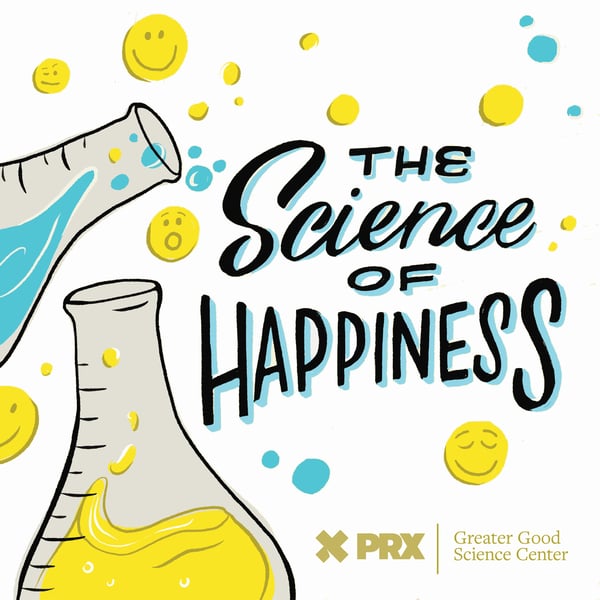How To Feel Better About Yourself
The Science of Happiness
PRX and Greater Good Science Center
4.4 • 1.9K Ratings
🗓️ 22 June 2023
⏱️ 20 minutes
🧾️ Download transcript
Summary
Self-compassion reduces our feelings of shame and self-doubt. We explore a practice to help quiet our inner critic with kindness.
Link to episode transcript: https://tinyurl.com/ytek6jxk
Episode summary:
What does your inner critic sound like? For René Brooks, it’s the adults who misunderstood her ADHD symptoms as a child, before she was diagnosed later in life. For our show, René tried a self-compassionate writing exercise that helped her re-examine how she treats herself in difficult situations. She highlights why self-compassion is so important for marginalized communities in particular, and how as a Black woman, she puts double the pressure on herself to achieve and has come to use shame and self-judgment to motivate herself. The practice helps her to disrupt that tendency by noticing the way she speaks to herself and learning to take a more compassionate tone, instead. Later, we hear from psychologist Serena Chen, who expands on how cultivating self-compassion can help us embrace our true selves, which can lead to greater life satisfaction, increased well-being and closer social relationships.
Practice:
Think of something that makes you feel guilty, ashamed or insecure.
Notice how you feel and write down your emotions.
Imagine someone who loves you unconditionally and write a letter to yourself from their perspective, using the tone they would use with you, and expressing acceptance and understanding. Acknowledge that no one is perfect and there are likely many people struggling with the very same thing you are.
In a compassionate way, ask yourself whether there are things that you could do to improve or better cope with this negative aspect. Focus on how constructive changes could make you feel happier, healthier, or more fulfilled, and avoid judging yourself.
Try to complete the practice on a weekly or monthly basis.
Learn more about this practice at Greater Good In Action:
https://ggia.berkeley.edu/practice/self_compassionate_letter
Today’s guests:
René Brooks is the creator of the blog Black Girl, Lost Keys. She draws on her personal experiences to coach and assist adults with ADHD.
Visit René’s Blog: https://blackgirllostkeys.com/
Follow René on Twitter: https://tinyurl.com/2p9caj5v
Follow René on Instagram: https://tinyurl.com/3a96882u
Follow René on Facebook: https://www.facebook.com/blackgirllostkeys/
Serena Chen is the Chair of the Psychology department at UC Berkeley. Her research is focused on self-compassion, wellbeing and social interaction.
Learn more about Serena and her work: https://tinyurl.com/mry3vx3v
Follow Serena on Google Scholar: https://tinyurl.com/3btm3jn8
Resources from The Greater Good Science Center:
The Five Myths of Self-Compassion: https://tinyurl.com/4tfp7d73
Why Self-Compassion Trumps Self-Esteem: https://tinyurl.com/5a6phdx3
Why Is Self-Compassion So Hard for Some People? https://tinyurl.com/2x4v3r72
The Three Components of Self-Compassion: https://tinyurl.com/mwa2zddp
Want to Change your Life? Try Self-Compassion: https://tinyurl.com/2y2ryc6m
More Resources on Self-Compassion
Happiness Break: How to Be Your Own Best Friend, with Kristin Neff: https://tinyurl.com/3fj4yfrn
TED - Dare to rewire your brain for self-compassion: https://tinyurl.com/yc2ru73p
Harvard Health - The power of self-compassion: https://tinyurl.com/yc7usmx5
BBC - Why self-compassion – not self-esteem – leads to success: https://tinyurl.com/yj2zax8x
How have you tried practicing self-compassion? Email us at [email protected] or use the hashtag #happinesspod to tell us about it.
Help us share The Science of Happiness! Rate and follow us on Spotify, and share this episode with a friend: https://tinyurl.com/4uyr2w35
Transcript
Click on a timestamp to play from that location
| 0:00.0 | I had a teacher scream at me at the top of his lungs when I was in middle school about |
| 0:09.3 | not doing homework and about how I was never going to get anything right and about how |
| 0:13.8 | I was too stupid to turn my work in on time. |
| 0:19.5 | So I told my mother and of course she brought herself up to the school to tell them not |
| 0:25.3 | to talk to me like that at all. |
| 0:28.1 | And maybe a week or two later, he was frustrated with me again and let me have it again and |
| 0:33.9 | said, and don't bother to tell your mother. |
| 0:37.5 | And I didn't. |
| 0:40.9 | When you go out in the community and you talk to people with ADHD, I think no matter what |
| 0:47.1 | our symptoms are, there are a ton of us who experience a lot of overwhelming shame |
| 0:53.3 | about it, especially if you grow into adulthood, undiagnosed because people are wondering |
| 1:00.2 | why you can't be on time, why you're not organized, why everything around you is always chaos. |
| 1:07.0 | And you don't know why either. |
| 1:10.4 | It's easy to internalize those types of messages and get really shamey and blaming with |
| 1:15.7 | yourself and go, okay, well, even though I'm trying really hard, this isn't working |
| 1:20.3 | out. |
| 1:21.3 | Maybe I'm just broken. |
| 1:34.5 | I'm Dacker Keltner. |
| 1:35.8 | This is The Science of Happiness. |
| 1:38.1 | Today we're talking about shame, self-compassion, neurodivergence, and where they intersect. |
| 1:43.4 | Here to join us is Renee Brooks, the creator of Black Girl Lost Keys, the blog and online |
| 1:49.1 | coaching business for adults living with ADHD. |
... |
Please login to see the full transcript.
Disclaimer: The podcast and artwork embedded on this page are from PRX and Greater Good Science Center, and are the property of its owner and not affiliated with or endorsed by Tapesearch.
Generated transcripts are the property of PRX and Greater Good Science Center and are distributed freely under the Fair Use doctrine. Transcripts generated by Tapesearch are not guaranteed to be accurate.
Copyright © Tapesearch 2025.

